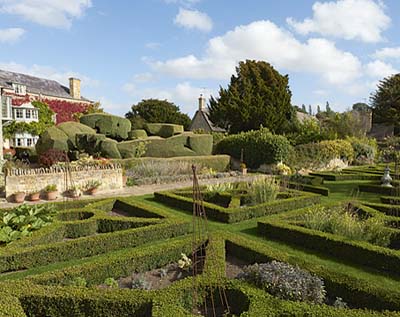Country house gardens: do they add value?
A well-maintained country house garden can be an aid to selling, but only to like-minded people keen to put in the time and money


Exquisite houses, the beauty of Nature, and how to get the most from your life, straight to your inbox.
You are now subscribed
Your newsletter sign-up was successful
The garden remains the big selling point of most country houses. Most buyers will want a good garden as it protects the house, provides enjoyment and is an important part of living in the country. However, some are more particular than others. David King of Winkworth (020-7871 0589), who sells country houses both in the UK and France, is reminded of an occasion a few years back. ‘We were selling a property in France, and had an interested buyer who insisted he wouldn't come and see it until we could tell him the exact pH level of the land. He was mad-keen on rhododendrons and azaleas, which, of course, need an acidic soil, and he wouldn't contemplate a house without it.'
As the year progresses, gardens become more significant to buyers, and move up their list of priorities as outside entertaining possibilities increase. This, in turn, encourages many to launch their houses on the market at a time when the gardens-subject to weather conditions-begin to come into their own. But one buyer's dream garden can very easily be another's idea of a high-maintenance nightmare to tame.
The key, of course, is to try to aim somewhere in the middle, being ever-conscious of your potential buyer's desires. ‘We've noticed that younger country-house owners like outdoor space for entertaining, but sometimes aren't as interested in having a mature garden or spending too much time or money on maintaining it,' explains James Grillo of Chesterton Humberts (020-7594 4746). ‘For more mature buyers, or those with an interest in gardening, having an established garden is a key factor in the purchase.'
Right house, right setting
‘The perfect country house needs to have all the components in place in order to appeal to a wider number of buyers, and the gardens play a role,' says Edward Sugden of buying agents Property Vision (01635 813130). ‘Having a beautiful, mature garden that's reflective of the property's period can, in some cases, increase the property's price by 10% or more.' However, the most important thing is that the garden blends harmoniously with the house. ‘Georgian houses should have a formal garden, whereas farmhouses can have a more relaxed garden with herbaceous borders, a vegetable patch and orchard,' recommends Mr Grillo.
The cost of running a formal garden is still a concern for many potential buyers. ‘The one question you can be almost guaranteed to be asked when you're selling a house with a formal garden is how much staff it'll require for upkeep,' adds Mr King. If a garden looks very labour-intensive, the key is that this is balanced by the stature of the house. ‘It's fine if it's a house that can afford a gardener, but not ideal if the garden's size is greater and grander than that of the actual house,' says Dawn Carritt of Jackson-Stops & Staff (020-7664 6644).
In such a case, the value of the house can be affected, as buyers will be put off by the maintenance costs. ‘I once saw a house on the market that was owned by a garden designer that had immaculate grounds and three full-time gardeners. The cost of upkeep frightened off a number of potential purchasers,' comments Mr Sugden.
Exquisite houses, the beauty of Nature, and how to get the most from your life, straight to your inbox.

The ‘wilderness garden'
If you're selling a house with a garden that has no structure and just a lawn, don't despair-there are some buyers who would like to buy a blank canvas that they can make their mark on. However, make sure you still present it in a way that allows it to be shown off to best advantage. ‘Even if you have a "wilderness garden",' states Miss Carritt, ‘make sure you cut it back so that buyers can walk the boundaries.' Alternatively, create a bit of interest by mowing most of the grass but leaving a backdrop of rough grass where wildflowers such as cowslips and cornflowers grow through. ‘That can help add something to the scope of the setting,' suggests Mr King.
New trends
‘The big thing that has happened in the past few years is the resurgence of interest in vegetable gardens,' believes Miss Carritt. ‘Prior to that, the trend was for large lawns and Minimalist garden architecture, but now, the vegetable garden is back it takes the hassle out of having to buy organic food.' Size-wise, these don't have to be too large a number of raised beds or pots will suffice, as few want to gather a huge harvest. ‘But if buyers see a productive vegetable garden, they like the idea of joining the grow-your-own team.' Most garden centres have cottoned on to this, and are now selling vegetables as small plants, so you don't have the hassle of raising the seedlings. ‘This switch to wanting gardens that are productive is noticeable around the country.'
Need to know
Country Life Gardens Editor Kathryn Bradley-Hole's top tips for preparing for the launch
* Make sure the lawn is regularly mowed
* More importantly, trim the edges-it makes all the difference to its appearanc
* Dead-head spent flowers-as Rosemary Verey used to say: ‘It's like combing your hair'
* Plant some welcoming pots to place near the doorways and include fragrant things such as lilies and heliotropes (for more on scented flowers, see page 102)
* If you're selling at a time when naturalised bulbs are dying down in the grass, mow pathways around the areas so at least the wild bits look controlled
* Ensure any overhanging branches that are likely to poke visitors in the eye as they look around the garden are trimmed back
* If a tree has fallen near the house, get someone to come in with a stump grinder, otherwise you might put off potential buyers who immediately see a problem they'll have to have fixed

